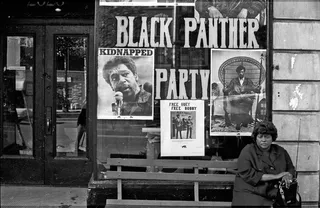5 Civil Rights Activists Who Are Imprisoned
Some activists are regarded as political prisoners.

1 / 6
Activists Who Are Imprisoned - The fight for civil rights in the U.S. is often remembered by keystone events like Martin Luther King Jr.’s March on Washington address. But groups like the Black Panthers and the Black Liberation Army also simultaneously fought for fairness and justice. Several of those activists are serving life sentences for taking the lives of innocents during their quest for equality. Here’s a look at the African-Americans who are living out their lives away from the society they fought to help establish. – LaToya Bowlah (Photo: Michael Ochs Archives/Getty Images)
Photo By Photo: Michael Ochs Archives/Getty Images

2 / 6
Russell Maroon Shoatz, 69 - Russell Maroon Shoatz was a community activist who founded the Black Unity Council and served in the Black Liberation Army prior to his 1971 conviction for murdering a Pennsylvania police officer. On May 8, 2013, the self-designated "New African Political Prisoner” Shoatz filed a lawsuit demanding an end to his solitary confinement. (Photo: Pennsylvania Police Department)

3 / 6
Ed Pointdexter, 70 - Ed Poindexter was one of the leading members of Omaha, Nebraska’s Black Panther chapter. The chapter worked to desegregate Omaha’s Peony Park Swimming Pool and tackled domestic issues such as welfare rights, police brutality, absentee landlords and Omaha’s school system. Poindexter and Mondo we Langa were sentenced to life in prison in 1971 on convictions for a bombing that resulted in the death of an Omaha police officer. (Photo: David Fenton/Getty Images)

4 / 6
Mondo we Langa, 64 - Mondo we Langa (formerly known as David Rice) is regarded as a political prisoner in Nebraska State Penitentiary since 1971 for a bombing which resulted in the murder of an Omaha policeman. Prior to his life sentence, Langa worked in the Black Panther’s breakfast-for-children program and participated in community groups such as the Ad Hoc Education Planning Committee, which addressed racism in the Omaha public school system. While imprisoned, he contributes stories and poems to various literary journals. (Photo: Photo12/UIG/Getty Images)

5 / 6
Herman Wallace, 71 - Imprisoned since 1971 in Angola, Louisiana, for an armed robbery, Herman Wallace organized the Black Panther chapter called Angola 3. The group advocated desegregation within the prison, helped prisoners file legal papers and led organized strikes for better conditions until he was convicted of killing a prison guard in 1972. But with one of the witnesses being legally blind and no physical evidence linking the accused Wallace and another Angola 3 member, Albert Woodfox, to the crime, the two continue to fight their convictions. In 2009, Wallace was moved to Hunt Correctional Centre in Louisiana. (Photo: MSNBC)
